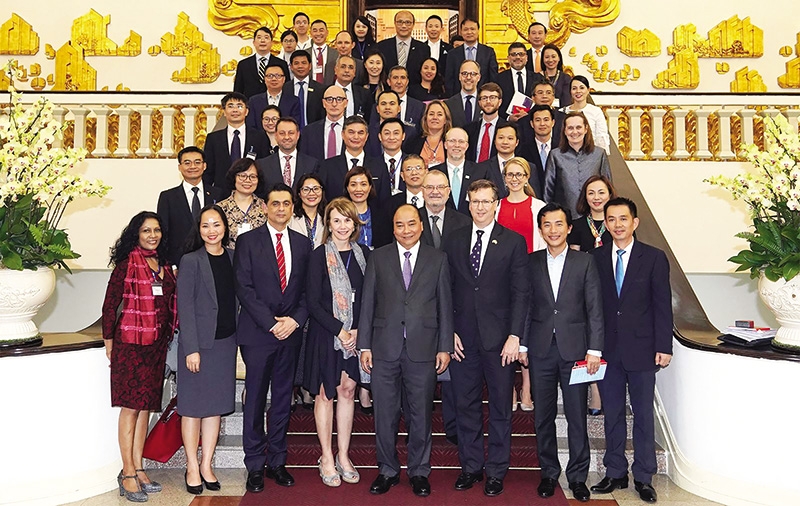Fostering further prosperity
 |
| Prime Minister Nguyen Xuan Phuc meets with the US-ASEAN Business Council in Hanoi in March 2019 |
This year marks AmCham’s 25th anniversary serving as the “Voice of American Business” in Vietnam and our members remain committed to helping improve business conditions in order to strengthen the private sector and promote economic and social development here. This year also marks 25 years since the renewal of trade relations between Vietnam and the United States.
 |
| Adam Sitkoff |
Our bilateral commercial relationship has seen dramatic growth. What started out with $220 million in annual trade has grown to over $60 billion today. In 1994, Vietnam was America’s 95th largest source of imports. Today, it ranks 12th. The US remains Vietnam’s largest export market, and Vietnam is one of its fastest growing markets worldwide.
Today, the US and Vietnam are close partners and friends – something once thought unimaginable – and American companies and investors are now active in almost every sector of Vietnam’s economy, helping to integrate the country into global supply chains, creating quality jobs, and making the country more productive, safe, and cleaner. It is a credit to the people of both nations that we have been able to move beyond the tragedies of our shared past to build such a strong vibrant relationship.
Since our founding, AmCham has said that high-quality foreign investors not only help grow the economy here, but also helps grow the entire ecosystem of local companies and entrepreneurs. We support the government’s commitment to the development of Vietnamese small- and medium-sized enterprises and their increased participation in global supply chains.
The size and growth of economic ties and the tremendous economic interests both sides have in maintaining and expanding their relationship make it incumbent upon the US and Vietnam to develop a vision for the future of the commercial relationship. The business communities in both countries want to be partners in developing this vision for deepening trade and investment ties.
Today, we see tremendous opportunities for both the domestic and foreign business sectors. Ongoing global trade tensions have highlighted concern on concentrating production in a single country, and Vietnam is in a position to gain some of that opportunity. The careful implementation of Vietnam’s trade commitments could further enhance this.
Tax issues
For the past two decades, Vietnam’s competitive position was based on competitive labour costs and attractive demographics. Recently, labour costs have outpaced productivity gains which hurts Vietnam’s competitive position. There are always ways to improve the business climate, and AmCham members support policy approaches that improve productivity across a variety of sectors.
One way to improve productivity is by reducing the tax compliance burden on investors. Recent advances in e-tax and customs demonstrate the commitment of the Ministry of Finance and the General Department of Taxation (GDT) to reduce burdens at the filing stage and these programmes are saving time for companies.
However, while we recognise the need for tax authorities to meet revenue targets, we hope the GDT will hold local tax authorities accountable for keeping audit times to the period stipulated by the law so that our members do not have to suffer from excessive audits, examinations and inspections.
We urge the GDT and the General Department of Vietnam Customs begin to approve advanced pricing agreements for those eligible, which will reduce the time and uncertainty that characterise many tax and customs audits. Fair tax policy and implementation is important not only to attract new investment, but also to maintain and grow the investment that is already here.
Continued regulatory reforms and ensuring stability for existing investors is also important to the US business community here. Regulatory reform is the most cost-efficient means for stimulating and sustaining growth, and it is entirely within Vietnam’s control, independent of external market forces.
The prime minister’s Council on Administrative Procedural Reform is a significant step towards broad reduction of the regulatory burden on businesses that will save time and reduce avenues for corruption. At the same time, frequent regulatory and policy changes often affect current business activities here. In some cases, due to a new regulation, investors have been requested to stop business activities that they have been licensed for.
AmCham recommends that the revised Law on Investment include provisions that protect business activities already covered in existing licences, specifically, that business activities, terms, and conditions provided in investment licences or business registration certificates need to be protected against regulatory changes.
Last year, 76 per cent of all foreign direct investment (FDI) into Vietnam went into manufacturing, real estate, and retail trade. While those are certainly important growth areas, we want to also see FDI in building key infrastructure here. According to the Global Infrastructure Outlook by Global Infrastructure Hub, an initiative of the G20, Vietnam will need over $600 billion to reach its infrastructure goals by 2040.
The government does not have that amount of money and there are trillions of US dollars of global capital looking for stable long-term investments. Connecting that capital to investments in Vietnam’s infrastructure will speed the flow of goods and people, adding to productivity and reliability and will result directly in jobs and revenue for the state.
In addition, the quality of Vietnam’s operating environment and indeed the quality of life of its citizens rely on environmentally-friendly and dependable energy. With respect to power needs, there is an urgent need to address the growing shortfall in supply versus demand for electrical power.
This requires a price structure that reflects the true costs of production, and encourages efficiencies and a means of tapping into private power generation like rooftop solar through improved direct power purchase agreements. And sustainable power requires renewable sources and development and upgrading of the transmission and distribution system.
US companies are global leaders in this sector and want to help ensure that Vietnam’s energy development meets the environmental, health, economic, and geopolitical security goals of the country. Infrastructure and energy are vital to securing Vietnam’s growth.
Digital economy development
Our companies also want to see a progressive policy approach by the government to unlock the full potential of the digital economy here because, in today’s world, you cannot separate the digital economy from the real economy. The digital economy significantly reduces costs, provides products and services to a broader range of consumers, and increases access to newer and bigger markets.
We look forward to working with Vietnam’s leadership, and our companies stand ready to provide expertise as Vietnam develops rules on emerging technologies like e-payments, digital content services, Artificial Intelligence (AI), and smart cities.
Setting good policies that enable the use of mobile wallets and other electronic payment systems can help discourage the use of cash, facilitate more productive e-commerce, and reduce opportunities for fraud.
In Vietnam, businesses in every sector and of every size are increasingly dependent on a secure, stable, and trusted internet to carry out their daily operations. This is why AmCham strongly supports the government’s objective of promoting the development of the internet and digital economy in Vietnam while ensuring data security and the protection of Vietnamese internet users.
Ensuring the free flow of data is very important, and we look forward to working with Vietnam’s leadership on policy approaches that advance the government’s objectives while minimising disruption to businesses, the economy, and Vietnam’s development.
We also note that growth in financial services and fintech sectors will depend on implementation of a legal, regulatory, and policy framework that facilitates investment and enables these sectors to continue contributing to Vietnam’s financial inclusion and prosperity.
Today, the Vietnamese banking sector has one of the lowest foreign ownership limits (FOL) relative to its regional peers. Increasing the FOL for banks would allow them to raise international capital in the context of potential mid- to long-term capital constraints that they face as they execute growth plans to support the country’s economy.
In addition, this would enable Vietnam to meaningfully deepen its capital markets and attract foreign institutional investors who can provide liquidity into the market.
The issues raised above will address long-standing market access concerns and will support Vietnam’s aspirations to propel itself into the next sphere of economic competitiveness.
What the stars mean:
★ Poor ★ ★ Promising ★★★ Good ★★★★ Very good ★★★★★ Exceptional
Related Contents
Latest News
More News
- Kurz Vietnam expands Gia Lai factory (February 27, 2026 | 16:37)
- SK Innovation-led consortium wins $2.3 billion LNG project in Nghe An (February 25, 2026 | 07:56)
- THACO opens $70 million manufacturing complex in Danang (February 25, 2026 | 07:54)
- Phu Quoc International Airport expansion approved to meet rising demand (February 24, 2026 | 10:00)
- Bac Giang International Logistics Centre faces land clearance barrier (February 24, 2026 | 08:00)
- Bright prospects abound in European investment (February 19, 2026 | 20:27)
- Internal strengths attest to commitment to progress (February 19, 2026 | 20:13)
- Vietnam, New Zealand seek level-up in ties (February 19, 2026 | 18:06)
- Untapped potential in relations with Indonesia (February 19, 2026 | 17:56)
- German strengths match Vietnamese aspirations (February 19, 2026 | 17:40)

 Tag:
Tag:




















 Mobile Version
Mobile Version